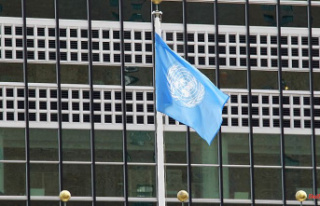After massive international criticism of a new blockade, Russia is now getting back into the grain agreement. For the Ukrainian President Selenskyj it is a stage victory. It shows both "the failure of Russian aggression" and the strength of Ukraine.
Ukrainian President Volodymyr Zelenskyy has hailed the resumption of the grain deal as a significant diplomatic result. "The Russian blackmail has led to nothing," said Zelenskyj in his evening video address. In particular, he highlighted the work of the mediators UN and Turkey and other partners. "Once again, everyone has seen that in our region there is only one threat to global food security, and that is the Russian Federation and nobody else," he stressed.
Moscow suspended the agreement on Saturday, citing an attack on its Black Sea fleet as the reason. On Wednesday, Russia's Defense Ministry claimed Moscow had received "written guarantees" from Kyiv that the shipping corridor used for grain transportation would not be used for military purposes. "We should think about their statements for a moment," Zelenskyj said.
Even before the start of the Russian attack on Ukraine, Russia had demanded security guarantees from the United States, the Ukrainian president said. Now, after more than eight months of war, the Kremlin is demanding security guarantees from Ukraine. "These are really noticeable changes," says Zelenskyj. "This shows both the failure of Russian aggression and how strong you and I are if we remain united."
The United States also expressed relief at the resumption of the grain agreement. US State Department spokesman Ned Price called for the four-month agreement to be extended later this month.
The grain agreement was signed in Istanbul on July 22, mediated by Turkey and the UN. It is intended to enable Ukrainian cargo ships to safely pass through the Black Sea on defined routes and is considered a key contribution to alleviating the global food crisis, which was aggravated by the Russian war of aggression against Ukraine. It has already enabled the export of around ten million tons of grain and other foodstuffs from Ukraine.












